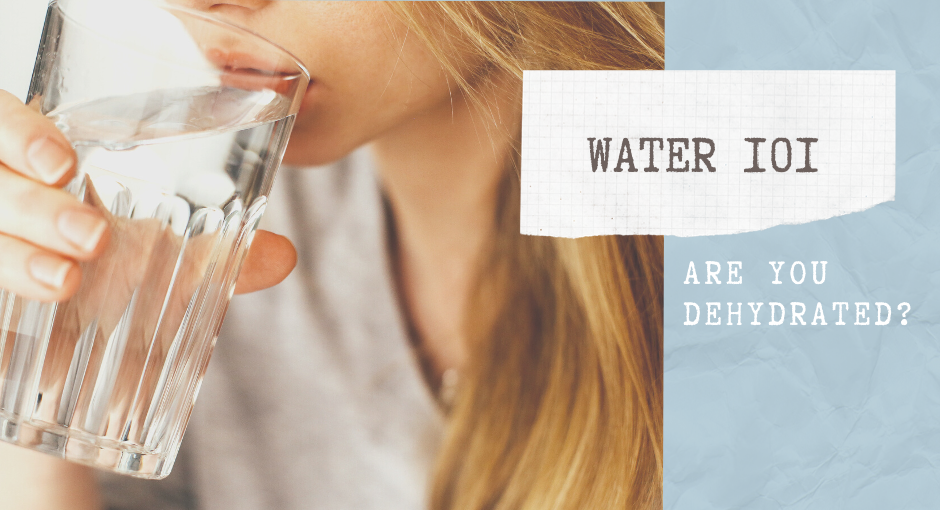Water. Often overlooked, taken for granted, or bypassed for a more enticing beverage, few of us realize what a huge role it plays in our health. Water is vital for life, making up an average of 60% of the human body.
Water performs essential functions in our bodies: it aids in digestion, regulates body temperature, excretes waste, flushes toxins, cushions our bones and joints, and transports nutrients, just to name a few.
Our bodies’ regulatory systems are incredible, and our ability to regulate our hydration is no exception. We have sensitive and precise homeostatic mechanisms that communicate thirst (and signal our kidneys to excrete less water through urine) when our water levels drop below a certain level. However, thirst is our first signal of dehydration. It’s far better to drink water before we feel thirsty to keep our bodies optimally hydrated.
What happens when we are mildly dehydrated? (a state many of us are in daily)
- We just feel…off. It’s common to experience dizziness, fatigue, headaches, and nausea.
- We put undue strain on our kidneys. They have to work overtime to economize water, when they’d much rather be operating with an abundance, excreting waste.
- We are more likely to reach for a sugary, caloric drink or overeat, replacing our water need with something calorie-rich.
Most of us simply don’t drink enough water. Or we are drinking water with additives that may not support health. Or maybe we are drinking water that doesn’t contain the minerals to support better health! Who knew it could be this complex. It’s not, really. I’ll give you a few tips on how you can add more water to your day, and how you can make sure your water is of the best quality.
- Figure out how much water you should get in a day. We still haven’t been able to determine the right amount to recommend across the board, as people have different needs based on climate, activity level, and how many fresh foods they’re eating, but a general guide is to take your weight divided by 2, and that is how many ounces of plain water you should aim to drink in a day. So, if you’re 150 lbs, you should aim to drink 75 ounces of water per day.
- Choose a favorite water bottle. Ideally glass or stainless steel so that it doesn’t leach any chemicals into the water. It should have a drinking spout or straw that you like to drink from. This may sound trivial, but it can make a big difference! (This one is my current favorite, and I have my eye on this one.) Take note of how many ounces your bottle is. Then, based on the measurement above, figure out how many of these you need to drink per day. Using the example above and a 20 ounce water bottle, this person would need to drink a little less than 4 of these water bottles worth of water per day. It really simplifies the tracking to do it this way!
- Eat a lot of fresh fruit and vegetables. The water content ranges, but by eating whole, fresh foods you’re hydrating as you eat. Not only do you hydrate, but you get good fiber, vitamins and minerals at the same time. Win win!
- Add Sea Salt. Working out hard? Add a pinch of real sea salt (like Redmond Salt or Celtic or Pink Himalayan Sea Salt) to your water to properly hydrate and add the salt you lost through perspiration.
- Add lemon, cucumbers, or other fruit to infuse your water. This adds vitamins and minerals, helping your water to absorb more readily, and it also makes it more fun to drink!
- Drink 1-2 full glasses of water upon waking up. Your body is ready for water the minute you wake up, and many of us don’t get around to drinking water until later in the morning.
- Drink your daily coffee, but don’t go overboard. Coffee is a diuretic, and can cause urine excretion to increase by more than 40% and hydration levels to drop by 2% in people who are drinking excessive amounts or who are not habitual coffee drinkers. Interestingly enough, if you drink a moderate amount of coffee daily, your body adapts and it doesn’t increase urine excretion. Coffee ingestion does, however, result in more sodium and potassium loss, so replenishing those electrolytes through diet or a pinch of salt in your water is a good idea.
- Check your water source. This one is tricky. The vast majority of us drink tap water provided by the city, and though we’d hope it was perfectly pure, it’s full of contaminants that may not make us sick in the short-term, but can cause long-term damage. I currently use a fridge filter, which isn’t the best filter out there, but am considering buying a Berkey filter. Ideally, what we want is water that contains natural minerals, but not any of the other heavy metals or contaminants that are hiding in our tap water. Some people go so far as to bottle water from a natural spring. You can check your local tap water for contaminants here if you’re curious what you’re drinking. Bottom line: Any type of filter is better than nothing.
And as a final note, for all the moms out there, young children are especially vulnerable to dehydration as they are not as aware of their thirst and because of their greater surface area to body mass ratio. So, some of the tips above apply really well to children as well, particularly the fun water bottle, getting plenty of fruits and veggies, and making fruit-infused water together.
Sources:
https://www.ncbi.nlm.nih.gov/pmc/articles/PMC2908954/
https://www.ncbi.nlm.nih.gov/pmc/articles/PMC4207053/
https://journals.plos.org/plosone/article?id=10.1371/journal.pone.0084154

